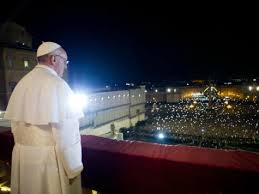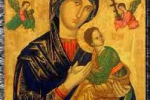The Papacy in Scripture – More Than Matthew 16

In an earlier blog post, I made the point that the role of St. Peter and his successors is made remarkably clear in Matthew 16:18-19 and its immediate context:
And I tell you, you are Peter (Gr.—petros—‘rock’), and on this rock (Gr.—petra—‘rock’) I will build my church, and the powers of death shall not prevail against it. I will give you the keys of the kingdom of heaven, and whatever you shall bind on earth shall be bound in heaven, and whatever you loose on earth shall be loosed in heaven.
Jesus here promises infallible authority to Peter that would empower him to speak in the place of Christ, or as his vicar on earth. Catholics believe just what the text says. When St. Peter (and his successors) “binds” something on earth, it is “bound” in heaven. That’s definitive authority–infallible authority–with the power of heaven to back it up!
A response I get fairly regularly in response to this is to claim the Church is using “this one text” to try and establish a dogma.
My first thought in response is always to say, “How many times does God have to tell you something before you will believe and obey it?” After all, Jesus only gave us the proper form for baptism one time in Matthew 28:19, and yet all Christians believe it to be the proper form nonetheless.
Nevertheless, I do think this is a valid question that deserves an answer: Is Matthew 16 the only text that demonstrates the truth of Peter’s primacy and of the papacy in Scripture?
The answer is a resounding no!
The List Goes On and On
Below is a list of biblical texts all related to the primacy of St. Peter and the Papacy. Word count limitations prevent me from quoting all of them; you’ll have to do some homework and look up some of these texts yourself. But when you do, you’ll notice there is not a single “rock” to be found among them.
Mind you, this is not an exhaustive list. There are more biblical texts we could take a look at. Consider this my top 18 list:
1. Matt. 14:23-27: St. Peter is uniquely and miraculously empowered by Jesus to walk on water, and when his faith begins to falter, our Lord does not allow him to go under. This is a prelude to Jesus promising to communicate his authority that can never fail to Peter in Matt. 16. The gift of the papacy is here assured not to depend upon the person of St. Peter or of his successors, but on the promise and power of Christ.
2. Matt. 17:24-27: After receiving the promise of authority in Matt. 16, St. Peter is once again given supernatural power, and this time to provide for both himself and Jesus when the first-century equivalent of the I.R.S. comes calling. Peter acts as Christ’s “vicar,” or, in the place of Jesus, in miraculous fashion, once again, guaranteed by Jesus not to fail. He “pays the tax” for both Jesus and himself. If you don’t think this is miraculous, it’s almost April 15 right now. God ahead down to the closest fishin’ hole, cast a line in, catch a fish, and let’s see if there’s enough money in the fish’s mouth to pay your taxes, let alone yours and someone else’s.
3. Luke 5:1-10: The multitudes that gather to hear Jesus at the shore of Lake Gennesaret press in on him so that he has to step off shore into one of two boats that are there docked. The boat he steps into just happens to be Peter’s boat. Hmmmm. Jesus then proclaims the gospel from the barque of Peter (5:1-3)! Sound familiar? Then, Jesus tells Peter to put out into the deep and let down his nets for a catch. Can you imagine the people present? They must have been thinking that Jesus was nuts! Multitudes have to just stand there and watch St. Peter go fishing? St. Peter then says, “We have toiled all night and caught nothing” (vs. 5), yet he lets down the nets at the command of Jesus. When they catch so many fish they need to bring out the other boat to haul in the load, Peter realizes that Jesus is calling him to more than just catching catfish! These fish are metaphors for Christians. Peter says, “Depart from me, for I am a sinful man” (vs.8)! But Jesus responds, “Do not be afraid; henceforth you will be catching men.”
Thus, St. Peter receives a unique and singular calling from Christ to be the fisher of men. And once again, Peter receives supernatural power that cannot fail to fulfill his unique calling.
4. Luke 22:24-32: In this text, Jesus teaches the apostles the true nature of authority, especially in verses 24-28. True authority in the New Covenant is commanded to be servant of all. He will speak with infallible authority just as Christ did, but he must also wash the feet of his brothers just as Christ did. In this context, Jesus said to the apostles:
[A]s my Father appointed a kingdom for me, so do I appoint for you that you may eat and drink at my table in my kingdom, and sit on thrones judging the twelve tribes of Israel. Simon, Simon, behold, Satan demanded to have you (Gr.—humas, plural—“you all”), that he might sift you (Gr.—plural again) like wheat, but I have prayed for you (Gr.—sou, singular—Peter alone) that your faith (Gr.—singular again) may not fail; and when you (Gr.—singular) have turned again, strengthen your brethren.
In the context of committing his kingdom authority to the apostles to govern the church (the “Israel of God”—see Gal. 6:16), Jesus especially prays for Peter so that he may be the source of strength and unity for the rest of the apostles. If the apostles want to be protected from the devil’s attempts to divide and destroy them and the Church, they must be in communion with Peter. And notice, Jesus says specifically to Peter, that, literally from the Greek text, “the faith of you [Peter] will not fail.” This is precisely what the Catholic Church has been teaching for 2,000 years!
5. John 10:16: Jesus prophesied:
And I have other sheep that are not of this fold; I must bring them also, and they will heed my voice. So there shall be one flock, and one shepherd (emphasis added).
Who is this prophetic shepherd? The answer seems simple. And on one level it is. Jesus declared himself to be “the good shepherd” (Gr.—poimein—“shepherd” or “pastor”) in John 10:14. Yet, if we dig deeper into the text we discover another meaning as well. In the context of prophesying about this “one flock” and “one shepherd,” Jesus says he must gather “other sheep” referring to the gentiles. Who does our Lord use as the shepherd to bring this prophecy to pass? The answer is found in our next two texts.
6. John 21:1-17: Here, we find another example of Jesus aiding the fishing of the apostles who “caught nothing” all night long (vs. 3). At the command of Jesus they let down their nets and catch an astonishing 153 “large fish” (vs. 11). When Jesus commands the net to be hauled ashore, St. Peter heaves the entire net of fish to shore by himself. No man can lift that size of a catch out of the water and on to the shore by himself. If you take these words literally to mean Peter actually did this, it seems Peter was given supernatural strength to do what no man could naturally accomplish. Fish are symbols representing the faithful (recall Luke 5:8-10). And the symbol of “the net” is used elsewhere in the New Testament for the Church (see Matt. 13:47). Not only is Peter’s ability to carry these “fish” (all the faithful) a miracle, but the fact that the “net” is not broken is also extraordinary. The message seems to be that the Church Jesus establishes containing all of God’s faithful with Peter packing the power will never be destroyed!
It is in this context that Jesus then asks St. Peter three times, “Do you love me… Do you love me… Do you love me?” When Peter responds in the affirmative the second time, Jesus responds by commanding Peter to “tend (Gr.–poimaine—’shepherd’) my sheep” (vs. 16). Jesus the shepherd here commissions Peter to be the prophetic shepherd of John 10:16 to shepherd the entire people of God!
How do we know Peter was called to shepherd the entire flock? I would only ask this: How many of the sheep belong to Jesus? Answer? All of them. So how many of his sheep did Jesus entrust to St. Peter to shepherd? Answer? All of them.
7. Matt. 10:2: In the context of the calling and listing of the twelve apostles, Peter is referred to as “the first” apostle. We know he was not the “first apostle” chronologically. John 1:37-41 tells us Andrew believed Jesus was the Messiah first and told his brother Peter about him. Andrew would be the “first” chronologically. Peter was “first” in primacy.
Though the Greek word, protos (first), can certainly mean “first” chronologically, it can also denote “chief,” “superior” or “the first in rank.” In Acts 28:7, for example, protos is used to describe “the chief man of the Island, Publius.” In Matthew 20:27, we discover, “Whoever would be first among you must be your slave.” Luke 15:22 adds: “Bring forth the best robe…” And I Tim. 1:15 provides: “And I am the foremost of sinners.” All of these texts use protos in the sense of “chief” or “superior.”
Moreover, Christ is referred to as prototokos, or “first-begotten” in Col. 1:15. Here St. Paul uses protos in order to teach us about Christ’s eternal generation, which has been accomplished outside of time. He is; therefore, the creator and the one who has “preeminence” over all things, according to the text. Colossians 1:15-18 reads:
[Christ] is the image of the invisible God, the first-born (Gr.—prototokos) of all creation; for in him all things were created, in heaven and on earth…He is before all things…He is the head of the body, the church…that in everything he might be pre-eminent (Gr.—proteuon, a verb with the same root as protos and prototokos).
Thus, in a notably direct and overt manner, by referring to St. Peter as the “first” apostle, St. Matthew presents Peter (and his successors) just as we see him represented in the rest of the New Testament; he is revealed to be “chief” of the apostles, or to have a primacy of authority over all the apostles and, by extension, over the entire church.
8. Acts 1:15-26:
During those days Peter stood up in the midst of the brothers (there was a group of about one hundred and twenty persons in the one place). He said, “My brothers, the scripture had to be fulfilled which the holy Spirit spoke beforehand through the mouth of David, concerning Judas, who was the guide for those who arrested Jesus … For it is written in the Book of Psalms: “Let his encampment become desolate, and may no one dwell in it” (citing Psalm 69:25). And: “May another take his office” (citing Psalm 109:8). Therefore it is necessary that one of the men who accompanied us the whole time the Lord Jesus came and went among us … become with us a witness to his resurrection. So they proposed two, Joseph called Barsabbas, who was also known as Justus, and Matthias. Then they prayed, “You, Lord, who know the hearts of all, show which of these two you have chosen …” Then they gave lots … and the lots fell upon Matthias, and he was counted with the eleven apostles.
It is St. Peter who is clearly in charge in choosing and ordaining a new apostle to replace Judas. He stands in the midst of the apostles and gives an authoritative interpretation of Psalm 69:25 and Psalm 109:8. And mind you, these are not exactly obvious interpretations of these texts. Psalm 69:25 uses the plural, yet Peter applies it singularly to Peter. The context of Psalm 109:8 also uses the plural (see verse 20). This is not exactly self-evident. Yet, St. Peter then declares the apostles must choose a successor of Judas based upon these two texts. And there is nary a question from the rest of the apostles like, “Hey, Peter, that’s a pretty shaky interpretation of those two texts. What hermeneutical principles are you using, anyway?”
In the case of St. Peter, the old saying is true, “It is my (Peter’s) way or the highway.”
9. Acts 2:14-41:
It is St. Peter who is in charge at Pentecost and preaches the first sermon whereby 3,000 are baptized. And you’ll notice a theme we are going to often see in the Book of Acts (and in the Gospels as well). Peter is listed as a category all by himself. Acts 2 says, “But Peter, standing with the eleven, lifted up his voice and addressed them.” There’s Peter alone, and then there is “the eleven.”
10. Acts 3:1-10:
Peter and John are “about to go into the temple,” when a man who was “lame from birth” called out to them begging alms. We note that it is Peter who speaks and it is Peter who performs the first miracle in the Acts of the Apostles. Another “first” for St. Peter. We will see more.
11. Acts 4:3-12:
When St. Peter and St. John are arrested and called before the Sanhedrin, it is St. Peter in verse 8, who speaks for both and preaches boldly of Christ and the name of Jesus.
12. Acts 5:1-15: It is St. Peter who clearly depicted as in charge of the Church in collecting funds for world evangelism. And it is St. Peter who pronounces God’s judgment on Ananias and Sapphira, speaking for God in the process. And it is then, in verse 15, that after seeing “more than ever” numbers of converts flood into the Church, that the sick were brought to him in hope that even his shadow might pass over them so that they may be healed.
13. Acts 5:29: After the apostles were arrested and then miraculously set free by the angel of the Lord, they are before the Sanhedrin for the second time. St. Luke records:
Peter and the apostles said in reply, “We must obey God rather then men.”
Once again, St. Peter is set apart from the rest of the apostles. If he was just one of the apostles with no special position St. Luke would not set him apart like he does. Why does he do this? Because St. Peter has the keys of the kingdom (cf. Matthew 16:15-19). He is the Shepherd over the whole flock of God’s people (cf. John 10:11-16, 21:15-17).
In fact, every time St. Peter is mentioned in sacred Scripture with the other apostles, he is either listed first (see Matthew 10:2, Mark 3:16-19, Luke 6:13-16 and Acts 1:13, etc.), or given a special place apart from the other apostles (see I Cor. 9:5, Mark 1:36, Mark 16:7 and Luke 9:32) except for one example in Galatians 2:9. This one example is often used by non-Catholics to demonstrate absolute equality among the apostles or even to prove St. James to have been the true leader of the early Church rather than St. Peter.
And when they perceived the grace that was given to me (St. Paul), James and Cephas and John, who were reputed to be pillars, gave to me and Barnabas the right hand of fellowship, that we should go to the gentiles and they to the circumcised.
A closer look at the context clears up this apparent difficulty. In Galatians 2, St. Paul is speaking in the context of the church at Jerusalem. We know from Eusebius (Ecclesiastical History …) that James was the first bishop of Jerusalem after the apostles dispersed throughout the world. It would not be surprising to list James first in the context of the diocese (or city, as it were then) over which he presides. Even today, if there were a Council held in a diocese other than Rome, the local bishop would normally be given a special place of honor in some distinct manner. This, in fact, has been the case many times in the history of the Church. James should be given a place of honor because he is the head of local Church there in Jerusalem.
This is the context of Galatians 2. However, notice the difference between this second visit St. Paul made to Jerusalem and his first visit fourteen years earlier (cf. Galatians 2:1).
Then after three years I went up to Jerusalem to visit Cephas, and remained with him fifteen days. But I saw none of the other apostles except James the Lord’s brother (Gal. 1:18-19)… Then, after fourteen years I went up again to Jerusalem with Barnabas… and when they perceived the grace of God was given to me, James and Cephas and John, who were reputed to be pillars, gave to me and Barnabas the right hand of fellowship (Gal. 1:18-2:9).
St. Paul originally went to Jerusalem not to see James, though he did see James. He went to confer with St. Peter. After receiving revelation from God, St. Peter is the first man St. Paul wants to see. This was not just a casual meeting. It lasted fifteen days. It was fourteen years later (cf. Gal. 2:1), after St. Peter had gone and established his see in Antioch (cf. Gal. 2:11, Eusebius, Ecclesiastical History), that St. Paul lists James first in the context of the Church of Jerusalem.
An interesting not: There are four lists of apostles given in Scripture. Matthew 10:2-4 (which we saw before), Mark 3:16-19, Luke 6:13-16 and Acts 1:13. In every case St. Peter is first and Judas is last (except in Acts, Judas is not listed at all because he had committed suicide). In oriental culture, the listing of names is important. It connotes position and honor. Notice in all the lists the order is generally identical. There is a bit of juxtaposition in St. Mark’s list, but St. Peter’s place is always the same. This is reminiscient of the early Church. There was some juxtaposition in the early Church when it came to the second and third place of honor in the Church, but never a doubt who was at the helm: The Bishop of Rome.
14. Acts 8:14-23:
In this text we see St. Peter leading when he and St. John confirm the new converts in Samaria because of the evangelistic efforts of St. Phillip. And once again it is St. Peter who takes the helm in pronouncing judgment on Simon the sorcerer who wanted to buy the power to confirm or convey the Holy Spirit (verses 18-23).
15. Acts 9:32:
Here we have an interesting little passage in verse 32 most pass over too quickly.
As Peter was passing through every region, he went down to the holy ones living in Lydda (NAB).
Here we have St. Peter making his pastoral rounds. To what part of the Church? All of it! Why? St. Peter is the shepherd of the whole world. He then proceeds to do another first. He raises Tabitha from the dead in Joppa (cf. 9:40-43).
16. Acts 10:1-48:
In this chapter from the Acts of the Apostles, Jesus personally sees to the fulfillment of the prophecy of John 10:16, which we saw above. He appears to St. Peter and commands him to bring the gospel to the gentiles by way of Cornelius, the centurion. When Peter then “commanded [Cornelius and his household] to be baptized” in Acts 10:48, the prophecy of John 10:16 was fulfilled. There was now one fold and one shepherd for Jews and Gentiles. That ministry has continued to this day in the successors of St. Peter, the bishops of Rome.
It would be easy to pass over this text and miss its importance. It is most significant that it is St. Peter to whom God gives a vision to allow the gentiles to be baptized and enjoy full membership in the Church. This was a radical move! If you think we have a problem with racism in the 21st century, we have nothing on first century opinion of the gentiles!
If we read further, into Acts 11:18, after the other apostles and other disciples heard Peter declare what God had done, they say, in chapter 11:18:
When they heard this they were silenced. And they glorified God, saying, “Then to the gentiles also God has granted repentance unto life.”
They heard St. Peter speak and the question was settled. The question would continue to plague the Church with reference to how the gentiles and Jews were to harmonize in the Church. But the question of Gentiles being in the Church was settled by St. Peter and the question would not be raised again. Peter had spoken, the rest of the Church “held their peace.” Would to God we today would do the same!
17. Acts 12: 3-11:
In this text, St. Peter is arrested again. Notice that the entire Church then goes to ‘round the clock prayer for him until he is released miraculously. This is not recorded to have been the case when St. James or any others were arrested. When the head of a fledgling Church struggling for its existence is put in jail, you better believe everyone is praying!
18. Acts 15: 1-12:
The ministry of St. Peter as “the shepherd” of the Universal Church continues. When there was a heresy spreading in the church at Antioch (and elsewhere) so widespread and problematic that Paul and Barnabas could not quell the resulting confusion, the church there decided to “go up to Jerusalem to the apostles and elders about this question” (vss. 1-2). The question concerned salvation and the Old Covenant law in relation to the gospel. Some among “believers who belonged to the party of the Pharisees rose up, and said, ‘It is necessary to circumcise…and…to keep the law of Moses’ (vs. 5) or else you ‘cannot be saved’” (vs. 1). In particular, they spoke of the gentiles who were converting to Christ, but the same would apply to all. The real question was: Are Christians saved by the grace of Christ in the New Covenant or must they obey the Old Covenant as well for salvation? The first Church Council (of Jerusalem) was convened and the theological question was put to rest by the pronouncement of St. Peter.
The apostles and elders were gathered together to consider this matter. And after there had been much debate, Peter rose and said to them, “Brethren, you know that in the early days God made choice…that by my mouth the Gentiles should hear the word of the gospel and believe…we believe that we shall be saved through the grace of the Lord Jesus, just as they will.” And all the assembly kept silence… (Vs. 6-12, emphasis added)
Like we saw in Acts 11:18, when the Pope finally speaks on a matter, the rest are silent. And so it should be.
If you like this and you would like to learn more, click here.






